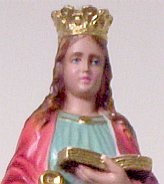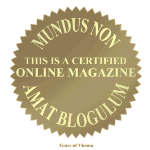Poem Hunter is a site that offers to send a daily (more or less) poetic selection to your email address. They don’t spam and they don’t appear to distribute your address to all and sundry. While many of the selections don’t appeal to me (save me from "Trees"), some are just right. They remind me to go back and look at a poet I’ve not read in a while.
In this case, Walt Whitman.
Way back when we first met, the Baron used to recite or read sections of "Leaves of Grass" to me. Until that point, I hadn’t cared much for Whitman. He was too…sprawling, perhaps, too loud and boisterous. Things changed; over the years I’ve come to appreciate his special voice.
The Poem Hunter is a grab bag of good and bad selections. Today's choice,
A Song, brings you up short. You realize that Whitman's expansive hope for America was in vain. “Comrade” has been so contaminated by events that lay in the future beyond Whitman's brief span, that we, the inheritors of his work, cannot use the word anymore without irony. Amazing to contemplate the evil done in the name of comradeship in the 20th century.
I hope, I pray that the 21st century will be less bloody, that fewer people will die at the hands of those wielding yet another sword in the name of yet another Utopia.
That hope may be in vain. Already I hear otherwise normal, kind people talking about the need for “population control” in this country but they don’t talk about the methods to be employed in this endeavor. They don’t say it out loud because it means abortion on one end of life and euthanasia on the other. Do they think that these ideas will have no effect on them or on the ones they love? Do they think the many deaths already accomplished have made our nation a better place?
The best revolution would be the realization that all of us are connected
at some level. Our individual selves are necessary, but they aren’t sufficient for living in the fullness of reality.
The old Catholic idea has been lost, the one which proposes the idea there is no private morality, we are always either building up or destroying by our behavior or our thoughts, public or private. None of us want to consider being so closely monitored. It interferes in the extreme with our idea of individual liberty. But what if the larger reality revealed individuals connected to one another by various webs of belonging (as Teilhard de Chardin believed)?
That view, of connections to one another, could have begun in the ancient Jewish belief of blessings and cursings. The translators of Christ’s words may have been a bit leery of the idea of cursing someone. “Blessed are the meek” was fine. But cursing the un-meek? Did they change the words so that we read now the easier-to-digest “woe unto him”? As in, perhaps, “woe unto him who hurts the least of these, the children…” . Sounds safe enough until you realize this may be an example of the Jewish belief in cursing someone, in proclaiming your hope in his receiving his just desserts for a particular behavior. Pedophilia, anyone?
We are modern now. We don’t believe in blessing people, and we certainly don’t discuss cursing them. Jung probably wrote about this somewhere, or perhaps the Italian Freudian, Roberto Assagioli, who wrote about the concept of the will. This lack of belief is the price we are willing to pay for our faith in science and our belief in its priests who reduce life to those things which can be expressed as provable hypotheses. We live inside this religion; thus we may not consider the webs of connections that might exist between and among us all. This notion cannot be proved, therefore it not to be considered, contemplated or discussed, much less researched! Heaven forefend!
But back to Whitman’s America. What a robust, finely drawn contemplation! What a blessing he made:
A Song
Come, I will make the continent indissoluble;
I will make the most splendid race the sun ever yet shone upon;
I will make divine magnetic lands,
With the love of comrades,
With the life-long love of comrades.
I will plant companionship thick as trees along all the rivers of
America, and along the shores of the great lakes, and all over
the prairies;
I will make inseparable cities, with their arms about each other’s
necks;
By the love of comrades,
By the manly love of comrades.
For you these, from me, O Democracy, to serve you, ma femme!
For you! for you, I am trilling these songs,
In the love of comrades,
In the high-towering love of comrades.
Those towers crumbled long ago, beaten down by the hammers and sickles of utopians. Though their stated aims use different terms now, the name of the game is the same: Destruction of all who are not exactly like us.
As for Whitman’s “inseparable cities”, if we really cared, we would treat the
destruction of Detroit by greed and corruption (look at the photos on that site) as we attempted to treat the destruction of New Orleans by Hurricane Katrina. Detroit did not, does not, deserve the terrible pestilence of greed visited upon it any more than New Orleans "deserved" the wrath of Katrina. The latter is different only in that it was an unavoidable act of nature(unless you stop to ask why New Orleans continues to exist where it does).
Detroit is becoming known as
The Feral City due to generations of soul-rotted "leaders" that bled her dry and left her corpse to rot, her people to scrabble for their bread.
The corrupters moved on, safe from the stench of their works. I do wonder sometimes if they are safe from the curses of those they left behind.
Is this the price we pay for killing our not-yet children and our old people? Is there a web of connections we cannot see, stuck as we are inside the limits of our faith in Scientism?
If that is not the case, then tell me, oh American, where did our love go?

 The future Baron is coming home for the evening. Time to scrounge up a few things and teach him to make chicken cacciatore. He's becoming tired of his limited menu maybe? It's fun to teach old tricks to young dogs. It's especially nice to have a young person around who is motivated to learn to cook cheaply.
The future Baron is coming home for the evening. Time to scrounge up a few things and teach him to make chicken cacciatore. He's becoming tired of his limited menu maybe? It's fun to teach old tricks to young dogs. It's especially nice to have a young person around who is motivated to learn to cook cheaply.



